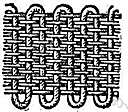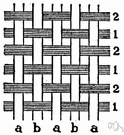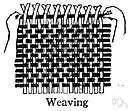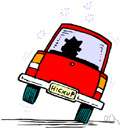weave
(wēv)v. wove (wōv), wo·ven (wō′vən), weav·ing, weaves
v.tr.
1.
a. To make (cloth) by interlacing the threads of the weft and the warp on a loom.
b. To interlace (threads, for example) into cloth.
2. To construct by interlacing or interweaving strips or strands of material: weave a basket.
3.
a. To interweave or combine (elements) into a complex whole: wove the incidents into a story.
b. To contrive (something complex or elaborate) in this way: weave a tale.
4. To introduce (another element) into a complex whole; work in: wove folk tunes into the symphony.
5. To attach hair extensions to (hair).
6. To spin (a web, for example).
7. past tense & past participle often weaved To make (a path or way) by winding in and out or from side to side: weaved our way through the heavy traffic.
v.intr.
1.
a. To engage in weaving; make cloth.
b. To work at a loom.
2. past tense and past participle often weaved To move in and out or sway from side to side.
n.
1. The pattern, method of weaving, or construction of a fabric: a twill weave; a loose weave.
2. A hairstyle in which hair extensions are attached to existing strands of hair.
American Heritage® Dictionary of the English Language, Fifth Edition. Copyright © 2016 by Houghton Mifflin Harcourt Publishing Company. Published by Houghton Mifflin Harcourt Publishing Company. All rights reserved.
weave
(wiːv)vb, weaves, weaving, wove, weaved, woven or weaved
1. (Textiles) to form (a fabric) by interlacing (yarn, etc), esp on a loom
2. (Textiles) (tr) to make or construct by such a process: to weave a shawl.
3. (Crafts) (tr) to make or construct (an artefact, such as a basket) by interlacing (a pliable material, such as cane)
4. (Zoology) (of a spider) to make (a web)
5. (tr) to construct by combining separate elements into a whole
6. (tr; often foll by in, into, through, etc) to introduce: to weave factual details into a fiction.
7. to create (a way, etc) by moving from side to side: to weave through a crowd.
8. (Veterinary Science) (intr) vet science (of a stabled horse) to swing the head, neck, and body backwards and forwards
9. get weaving informal to hurry; start to do something
n
(Textiles) the method or pattern of weaving or the structure of a woven fabric
[Old English wefan; related to Old High German weban, Old Norse vefa, Greek hyphos, Sanskrit vābhis; compare web, weevil, wasp]
ˈweaving n
Collins English Dictionary – Complete and Unabridged, 12th Edition 2014 © HarperCollins Publishers 1991, 1994, 1998, 2000, 2003, 2006, 2007, 2009, 2011, 2014
weave
(wiv)v. wove (esp. for 5,9 ) weaved; wo•ven wove; weav•ing; v.t.
1. to interlace (threads, yarns, strips, fibrous material, etc.) so as to form a fabric or material.
2. to form by such interlacing: to weave a basket; to weave cloth.
3. (of a spider or larva) to spin (a web or cocoon).
4. to form by combining various elements or details into a connected whole: to weave a tale.
5. to introduce as an element into a connected whole (usu. fol. by in or into): to weave a folk song into a musical comedy.
6. to combine (two or more things) so as to form a whole.
7. to make or move by winding or zigzagging, esp. to avoid obstructions: to weave one's way across a crowded room.
v.i. 8. to form or construct something by interlacing materials or combining elements.
9. to move or proceed in a winding course or from side to side: a car weaving through traffic.
n. 10. a pattern of or method for interlacing yarns.
[before 900; Middle English weven, Old English wefan, c. Middle Low German, Middle Dutch weven, Old High German weban, Old Norse vefa; akin to web; (definitions 5,9) in part continuing Middle English weven to wander, move to and fro < Old Norse veifa (compare waif)]
Random House Kernerman Webster's College Dictionary, © 2010 K Dictionaries Ltd. Copyright 2005, 1997, 1991 by Random House, Inc. All rights reserved.
weave
- nettles - Got their name because people used to weave them into nets.
- pretext - From Latin praetexere, "to disguise," from prae, "in front," and texere, "weave"—as something serving to conceal plans.
- texture - Once referred to a woven fabric, from Latin texere, "to weave."
- wasp - The insect traces back to an Indo-European root meaning "weave."
Farlex Trivia Dictionary. © 2012 Farlex, Inc. All rights reserved.
weave
When people weave cloth, they make it by crossing threads over and under each other using a machine called a loom. When you use weave with this meaning, its past tense is wove, not 'weaved'. Its past participle is woven.
They were famous for the brilliant patterns of cloth they wove.
'Broadloom' just means that the cloth was woven on a loom over 6 feet wide.
Weave has another meaning. If you weave your way somewhere, you keep changing direction while you go there, in order to avoid hitting things. When you use weave with this meaning, its past tense and past participle is weaved, not 'wove'.
A stout woman weaved her way along the edge of the pool.
Collins COBUILD English Usage © HarperCollins Publishers 1992, 2004, 2011, 2012
weave
Past participle: weaved/woven
Gerund: weaving
| Imperative |
|---|
| weave |
| weave |
Collins English Verb Tables © HarperCollins Publishers 2011
ThesaurusAntonymsRelated WordsSynonymsLegend:
| Noun | 1. |  weave - pattern of weaving or structure of a fabric weave - pattern of weaving or structure of a fabriccheck - a textile pattern of squares or crossed lines (resembling a checkerboard); "she wore a skirt with checks" open weave - a weave in which warp threads never come together, leaving interstices in the fabric plain weave, taffeta weave - a basic style of weave in which the weft and warp threads intertwine alternately to produce a checkerboard effect satin weave - a weave in which the filling and warp threads intersect in such a way as to give a smooth compact surface with no distinguishable twill line twill, twill weave - a weave used to produce the effect of parallel diagonal ribs warp - yarn arranged lengthways on a loom and crossed by the woof |
| Verb | 1. |  weave - interlace by or as if by weaving weave - interlace by or as if by weaving plait - weave into plaits; "plait hair" inweave - weave together into a fabric or design shoot - variegate by interweaving weft threads of different colors; "shoot cloth" tinsel - interweave with tinsel; "tinseled velvet" unweave - undo strands that have been woven together |
| 2. |  weave - create a piece of cloth by interlacing strands of fabric, such as wool or cotton; "tissue textiles" weave - create a piece of cloth by interlacing strands of fabric, such as wool or cotton; "tissue textiles"handicraft - a craft that requires skillful hands create from raw material, create from raw stuff - make from scratch loom - weave on a loom; "materials loomed in Egypt" brocade - weave a design into (textiles) lace - do lacework; "The Flemish women were lacing in front of the cathedral" twill - weave diagonal lines into (textiles) | |
| 3. |  weave - sway to and fro weave - sway to and fro | |
| 4. |  weave - to move or cause to move in a sinuous, spiral, or circular course; "the river winds through the hills"; "the path meanders through the vineyards"; "sometimes, the gout wanders through the entire body" weave - to move or cause to move in a sinuous, spiral, or circular course; "the river winds through the hills"; "the path meanders through the vineyards"; "sometimes, the gout wanders through the entire body"go, locomote, move, travel - change location; move, travel, or proceed, also metaphorically; "How fast does your new car go?"; "We travelled from Rome to Naples by bus"; "The policemen went from door to door looking for the suspect"; "The soldiers moved towards the city in an attempt to take it before night fell"; "news travelled fast" snake - move along a winding path; "The army snaked through the jungle" wander - go via an indirect route or at no set pace; "After dinner, we wandered into town" |
Based on WordNet 3.0, Farlex clipart collection. © 2003-2012 Princeton University, Farlex Inc.
weave
verb
1. knit, twist, intertwine, plait, unite, introduce, blend, incorporate, merge, mat, fuse, braid, entwine, intermingle, interlace She then weaves the fibres together to make the traditional Awatum basket.
2. zigzag, wind, move in and out, crisscross, weave your way The cyclists wove in and out of the traffic.
Collins Thesaurus of the English Language – Complete and Unabridged 2nd Edition. 2002 © HarperCollins Publishers 1995, 2002
weave
verb1. To move back and forth or from side to side, as if about to fall:
The American Heritage® Roget's Thesaurus. Copyright © 2013, 2014 by Houghton Mifflin Harcourt Publishing Company. Published by Houghton Mifflin Harcourt Publishing Company. All rights reserved.
Translations
يَتَمايَل، يَتَرَنَّحيُحيك، يَحْبِك، يَنْسِجيَرْوي قِصَّةً مُمْتِعَه
tkát
vævefortællesno sigspinde
kiemurrellakudoskutoamutkitella
szõsző
aka í hlykkjumsegja söguvefa, flétta
audėjasaustiregztivinguriuoti
cilpotizlocītieslīkumotsacerēt/izdomāt/stāstītu ast
spriadaťtkať
plestitkati
weave
[wiːv] (wove (vb: pt) (woven (pp)))A. N → tejido m
B. VT
1. (lit) [+ fabric, basket] → tejer
2. (fig) [+ story] → urdir
he wove a story round these experiences → urdió una historia con estas experiencias
he wove these details into the story → entretejó or intercaló estos detalles en el cuento
he wove a story round these experiences → urdió una historia con estas experiencias
he wove these details into the story → entretejó or intercaló estos detalles en el cuento
3. (weaved or wove (pt) (weaved or woven (pp))) (= zigzag) to weave one's way through the crowd → abrirse paso entre la multitud
he weaved or wove his way to the bathroom → fue hasta el baño haciendo eses
he weaved or wove his way to the bathroom → fue hasta el baño haciendo eses
C. VI
1. (lit) → tejer
2. (weaved (pt, pp)) (fig) (= move in and out) → zigzaguear
he weaves from side to side, trying to dodge his opponent → va zigzagueando or se mueve de lado a lado intentando esquivar a su rival
the motorbike was weaving in and out of the traffic → la motocicleta zigzagueaba or se abría paso entre los coches
the road weaves about a lot → el camino tiene muchas curvas, el camino serpentea mucho (liter)
to get weaving (o.f.) → poner manos a la obra
let's get weaving! → ¡pongamos manos a la obra!
he weaves from side to side, trying to dodge his opponent → va zigzagueando or se mueve de lado a lado intentando esquivar a su rival
the motorbike was weaving in and out of the traffic → la motocicleta zigzagueaba or se abría paso entre los coches
the road weaves about a lot → el camino tiene muchas curvas, el camino serpentea mucho (liter)
to get weaving (o.f.) → poner manos a la obra
let's get weaving! → ¡pongamos manos a la obra!
Collins Spanish Dictionary - Complete and Unabridged 8th Edition 2005 © William Collins Sons & Co. Ltd. 1971, 1988 © HarperCollins Publishers 1992, 1993, 1996, 1997, 2000, 2003, 2005
weave
[ˈwiːv] [wove] (pt) [woven] (pp) vi
(= make cloth) → tisser
(fig) [weaved] (pt, pp)
to weave in and out of sth [+ traffic, lanes] → slalomer entre qch
to weave among sth [+ traffic] → se faufiler dans qch
They weaved expertly among the rush-hour traffic → Ils se faufilaient avec adresse dans la circulation des heures de pointe.
to weave in and out of sth [+ traffic, lanes] → slalomer entre qch
to weave among sth [+ traffic] → se faufiler dans qch
They weaved expertly among the rush-hour traffic → Ils se faufilaient avec adresse dans la circulation des heures de pointe.
Collins English/French Electronic Resource. © HarperCollins Publishers 2005
weave
vb: pret <wove>, ptp <woven>n (= patterns of threads) → Webart f; (= loosely/tightly etc woven fabric) → Gewebe nt; material in a loose weave → Stoff m → in einer lockeren Webart; you need a tighter weave for a skirt → für einen Rock braucht man ein festeres Gewebe
vt
thread, cloth etc → weben (into zu); cane, flowers, garland → flechten (into zu); web → spinnen; he wove the threads together → er verwob die Fäden miteinander
(fig) plot, story → ersinnen, erfinden; (= add into story etc) details, episode → einflechten (→ into in +acc); he wove a romantic tale (a)round his experiences abroad → er spann seine Erlebnisse im Ausland zu einer romantischen Geschichte aus
pret also <weaved> (= wind) to weave one’s way through the traffic/to the front → sich durch den Verkehr fädeln or schlängeln/nach vorne (durch)schlängeln; the drunk weaved his way down the street → der Betrunkene torkelte die Straße hinunter
Collins German Dictionary – Complete and Unabridged 7th Edition 2005. © William Collins Sons & Co. Ltd. 1980 © HarperCollins Publishers 1991, 1997, 1999, 2004, 2005, 2007
weave
[wiːv] (wove (pp: pt) (woven (pp)))1. n → trama
2. vt (threads, basket) → intrecciare; (fabric) → tessere
he wove these details into the story → ha intrecciato nella storia questi dettagli
he wove a story round these experiences → ha intessuto una storia attorno a queste esperienze
he wove these details into the story → ha intrecciato nella storia questi dettagli
he wove a story round these experiences → ha intessuto una storia attorno a queste esperienze
Collins Italian Dictionary 1st Edition © HarperCollins Publishers 1995
weave
(wiːv) – past tense wove (wouv) : past participle woven (ˈwouvən) – verb1. to make by crossing strands in a pattern. to weave cloth.
2. to tell (an interesting story).
3. (past tense, past participle weaved) to move backwards and forwards or from side to side. The cyclist weaved in and out of the traffic.
ˈweaver nounKernerman English Multilingual Dictionary © 2006-2013 K Dictionaries Ltd.